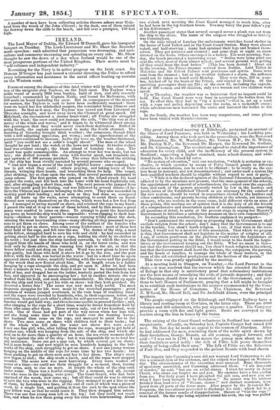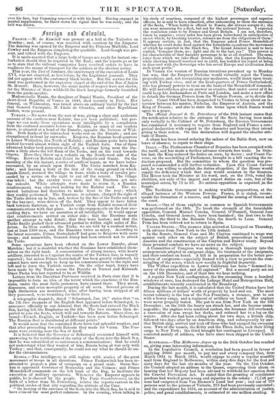SCOTLAND.
The great educational meeting at Edinburgh, postponed on account of the illness of Lord Paumure, was held on Wednesday ; his Lordship pre- siding. Among those who took part in the proceedings, were the Reverend Dr. Alexander, Mr. R. Macfarlane, Mr. Cowan M.P., Dr. G. Wilson, Mr. Dunlop M.P., the Reverend Dr. Harper, the Reverend Dr. Guthrie, and Dr. Cunningham. The resolutions agreed to stated the importance of education for every child, and the inefficiency of the present system in Scotland ; suggesting a higher standard, more school-houses, and addi- tional funds, to be raised by rates.
"No system of education," said one resolution, "which is sectarian or ex- clusive, or which operates by means of Privy Council grants to different churches or associations, can be said to be efficient : to be really so, the sys- tem Must be national, and not denominational ; and under such a system the best-qualified teachers should be eligible without regard to sect or party:' . . . . " While it is the declared opinion of the National Education Association, adhered to by the members now present, that the management of the'schools, the appointment and removal of schoolmasters, the control over the expendi- ture, and such of the powers presently vested by law in the heritors and presbyteries of the Established Church as are necessary for the conduct of the new system, should be vested in committees elected by the heritors and other contributors, and parents having children at the schools, yet inasmuch as many, who are zealous in the same cause, hold different views on some of these points, this meeting are of opinion that it is the duty of all the friends of a comprehensive and unsectarian system of national education, reserving all questions of detail, to unite at the present stage in urging her Majesty's Government to introduce a satisfactory measure on their own responsibility."
In seconding this resolution, Dr. Guthrie explained its purport-- "Don't understand the resolution as proposing that the Government shall exclude religion from the school ; don't fancy that the Government is to say to the teacher, You shan't teach religion. I say, if that were in the reso- lution, I would not be a member of this association. That which we propose is this, that Government shall not legislate in the matter of religion at all. I say, if certain gentlemen on the platform would resist the Legislature or the Government putting in the Bible, I would resist to the death the Legis- lature or the Government keeping out the Bible. What we mean is this— not that the Government should say, You shan't teach religion in the school, but that the Government shall leave the heritors, the ratepayers, the parents, and the heads of families, to manage the whole of these matters, in the room of the old established presbyteries and the heritors of the parish."
This view was greatly applauded by the meeting.
At a meeting held in Glasgow, on Tuesday,—the Lord Provost in the chair,—it was resolved that the success which has attended the Houses of Refuge in that city is satisfactory proof that reformatory institutions are the best means of remedying the evils of juvenile depravity; and that- the Chairman should draw up a memorial to the Government, and peti- tions to both Houses of Parliament, praying that a bill might be brought in to establish such institutions in the manner recommended by the Com- mittee of the House of Commons. The Chairman, the Reverend N. APLeod, Mr. Sheriff Bell, and Sir Archibald Alison, were the principal speakers.
The people employed on the Edinburgh and Glasgow Railway have a library and reading-room at Cowlairs, in the latter city. There are 3000 volumes and 300 subscribers, who pay sixpence a quarter. The Company provide a room with fire and light gratis. Books are conveyed to the readers along the line in boxes by the trains.
The raising of the Coast Guard volunteers in Scotland has commenced auspiciously. Already, on Saturday last, Captain Craio-ie had raised 250 men. On that day he made an appeal to the seamen of Aberdeen. After he had addressed the men, reminding them of the noble spirit shown by their forefathers, George Brands, an old seaman, stepped forward, and said—" I was out in 1798: I can assure the young men about me that their forefathers acted nobly : the folk of Fdtie will prove themselves worthy of being called their sons." The folk of Filtie are the fishermen of Foot Dee, and they responded to the gallant Brands with loud cheers.
The inquiry into Cumming's case did not warrant Lord Palmerston to ad- vise a commutation of the sentence, and the culprit was hanged on Wednes- day. The circumstances of the execution were unusual. Many thousands of spectators assembled, and Cumming addressed them. "I am innocent of murder," he said, "but am an awful sinner. I trust for mercy in Jesus Christ, who alone can forgive me and you. My enemies have a free pardon from me. For forty years I have ploughed the salt seas, and now you see what I have been brought to by foolishness." No sooner was his address finished than loud cries of "Shame, shame !" and distinct murmurs, were heard from all parts of the dense mass. After prayer by the Reverend Mr. Ferguson, the executioner proceeded to discharge his task ; which led to a renewal of the former marks of disapprobation. Shouts of "Cut the rope !" were heard. On the rope being adjusted round his neck, the cap was pulled
over his face, but Gumming removed it with his hand. Having engaged in mental supplication, he threw down the signal that he was ready, and the bolt was drawn.































 Previous page
Previous page